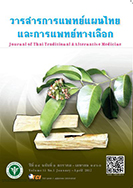Access to Traditional Knowledge, Genetic Resources and the Fair and Equitable Benefits-sharing
Main Article Content
Abstract
The objective of this research was to study the scenarios of domestic and international provisions
related to the access and benefit-sharing of traditional knowledge, genetic resources, and the fair and
equitable benefit-sharing of such knowledge, from legal documents, information, implementation reports
and to participate in study visits to related agencies. It has been found that there are limitations
on differences and diversity of primary and secondary laws; and they are related to many agencies, so
they could not be efficiently managed. In the management of Thai traditional knowledge and genetic
resources, the government should support the building of awareness and values. Moreover, the knowledge
about such matter should be promoted so as to lead to fair and equitable benefit-sharing by
creating a cooperating network and mechanism for all relevant agencies, especially the citizen sector, to
exercise their rights, duties and responsibilities in the management of Thai Traditional Knowledge and
genetic resources. They all should be supported to have a sense of ownership as members of society or
community that is the source of such knowledge and genetic resources. Their learning and public
awareness should also be raised about their responsibility and participation in maintaining the balance
between protection, conservation and utilization by using the fair and equitable access and benefitsharing
mechanisms to ensure the sustainability of Thai traditional knowledge and genetic resources.
Article Details
References
2. Department of Agriculture. The Plant Species Protectin Act B.E. 2542 (1999); 1999. p. 1-24. (In Thai)
3. Department of Intellectual Property. The Patent Art B.E. 2522 (1979); 1979. p. 1-30. (In Thai)
4. Office of Natural Resources and Environment Policy and Planing. Documents for the 1st Meeting of the Sub-Committee on the Biodiversity on May 15, 2015.
2015;17(10):1-8. (In Thai)
5. Department of Thai Traditional Medicine and Alternative Medicine. The Act on the Protection of the Thai Traditional Medicine and Alternative Medicine Wisdom B.E. 2542 (1999) and related laws. 3rd edition. Bangkok: The Agricultural Cooperative Federation of Thailand Publishing House. 1999;53(2):1-27. (In Thai)
6. Giddens A. The third way. Cambridge: Polity Press; 1998. p. 3-6.
7. Suthawaet C. The schools of thought in Thailand: The basic critical evaluation and the school of eco-political thought in the dimension of cultural community. In: 60
years of Chatthip Narksupha (Phongphaijit P, Editor). The Eco-Political Center, Faculty of Economics, Chulalongkorn University. 2000;27(2):13-109. (In Thai)
8. World Intellectual Property Organization (WIPO). [Internet]. [cited 2016 June]. Available from: http://www.wipo.int/tk/en/igc.
9. United Nations Convention on Biological Diversity, opened for signature 5 June 1992, 31 UNTS 818 (entered into force 29 December 1993).
10. CITES: Convention on International Trade in Endangered Species of Wild Fauna and Flora [Internet]. [cited 2016 June]. Available from: http://www. neofarmthailand.com/index.php.


